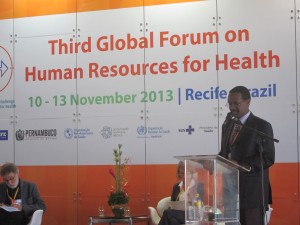Committing to CHWs: Preparing for the post-2015 development agenda

This week, Ministers of Health from all over the globe are convening at the 66th World Health Assembly (WHA), the World Health Organization’s decision-making body. The assembled governments have the power to call for stronger, concrete action on health workforce issues, specifically targeting the frontlines of care. On this occasion, let’s revisit some recent commitments that illustrate the various ways that countries can support community health workers.
At the “Global Forum For Human Resources For Health” conference (held in Brazil last November), many participating countries made commitments to health workforce topics in need of significant effort and focus in the run-up to 2015, and beyond. These commitments kept pouring in, even after the conference – the Global Health Workforce Alliance (GHWA) has received 83 of them to date.
Here’s a selection of some of the commitments made last November that focus on an oft-ignored part of the health workforce: community health workers (CHWs). These commitments are practical, achievable, and will be a substantial contribution to efforts towards universal health coverage (UHC). Let’s make sure that the momentum from Brazil carries on throughout the year!
+++++++++++++
Ethiopia
Previously, Ethiopia focused on rapid expansion in the quantity of CHWs through their Health Extension Workers (HEW) Program. Now, the country aims to strengthen the quality of their 38,000 HEWs by: improving the quality of HEW education, planning and management capacity, and revising their general health workforce strategy to more accurately reflect current labor and market trends.
Malawi
Malawi committed to improving compensation for their CHW cadre, the Health Surveillance Assistants (HSAs), and creating a clear career pathway for all rural health workers. The government has also announced that it will directly engage the states more productively, so that health workforce management is successful at the sub-national level.
Somalia
Somalia aims to remedy its health workforce shortages and misdistribution by recruiting, training and deploying 100 “lady CHWs” in rural areas by June 2014. In addition, the government promised to recruit and train at least 100 midwives over the next two years; combined, these goals will help be instrumental to Somalia’s efforts to achieve the Millennium Development Goals (MDGs) and prepare for UHC.
Uganda
Uganda pledged to enhance the quality of pre-service training for their CHWs (called VHTs) by standardizing guidelines for the operation of their health training institutions. The government will also focus specifically on educating health workers in short supply, like midwives, to improve health coverage in traditionally under-served regions of the country.
+++++++++++++
 All in all, the commitments that emerged from the Brazil Forum leave us hopeful. Numerous stakeholders, from governments to nonprofit organizations, commented on the importance of CHWs in achieving their health-related goals. The 1mCHW Campaign applauds all the stakeholders who recognize the potential of CHWs as an integral part of health workforces, and as prerequisite for the push towards UHC in the post-2015 development agenda.
All in all, the commitments that emerged from the Brazil Forum leave us hopeful. Numerous stakeholders, from governments to nonprofit organizations, commented on the importance of CHWs in achieving their health-related goals. The 1mCHW Campaign applauds all the stakeholders who recognize the potential of CHWs as an integral part of health workforces, and as prerequisite for the push towards UHC in the post-2015 development agenda.
Now, however, the real work begins: implementation. The 1mCHW Campaign urges the participants at the World Health Assembly to deliver on commitments to CHWs, and ensure that there are adequate numbers of well-trained and equipped health workers on the frontlines to fulfill the promises that they are making for the coming decades.

Comments are closed